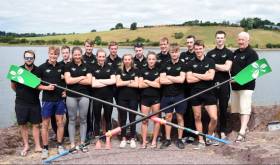Displaying items by tag: Heaphy
#Rowing: The McCarthy twins, Jake and Fintan, gave Ireland its fourth A Finalist at the World Under-23 Rowing Championships in Poland today. They finished second in the semi-final of the lightweight double sculls. This was a close race: Spain led early on and eventually won from fast-finishing Ireland, who had won a battle with New Zealand, who took the third qualifying spot, and Portugal, who took fourth.
The early stages looked very promising for the women’s lightweight double of Lydia Heaphy and Margaret Cremen in their semi-final. They led to 700 metres, but then Greece and, with a more consistent challenge, Italy, moved ahead. The early part of the third quarter saw the Ireland crew fight a battle with Australia. The Australians moved into a clear third and from there Ireland slipped back. They finished fifth, behind the Netherlands, who took fourth.
World Under-23 Rowing Championships, Day Four, Poznan, Poland
Men
Lightweight Double Sculls – Semi-Finals (First Three to A Final; rest to B Final) 1 Spain 6:41.66, 2 Ireland (F McCarthy, J McCarthy) 6:42.45, 3 New Zealand 6:44.17.
Single Sculls – Semi-Final (First Three to A Final; rest to B Final): 1 United States (B Davison) 7: 14.65, 2 Ireland (R Byrne) 7:17.88, 3 Germany (M Weber) 7:24.24.
Lightweight Single Sculls – D Final (Places 19 to 24): 2 Ireland (H Sutton) 7:21.95.
Women
Lightweight Double Sculls – Semi-Finals (First Three to A Final; rest to B Final): 1 Italy 7:24.69, 2 Australia 7:30.08, 3 Greece 7:31.23; 5 Ireland (L Heaphy, M Cremen) 7:47.66.
Skibbereen Caught By a Lens
#Rowing: The West Cork arts centre, Uillinn, is hosting an exhibition of images of Skibbereen Rowing Club. Photographer Debbie Heaphy recorded the action at the club for four years, often accompanying coach Dominic Casey in his launch on early morning training sessions. “Having spent the last four years with these athletes, I am totally in awe of the resilience, focus and commitment of these young people. I have watched them strive to achieve what, at times, would seem to be unreachable goals,” Heaphy said.
The year 2015 was a very successful one for the club, with 17 Skibbereen athletes rowing for the Irish national squad, and two rowers, brothers Gary and Paul O’Donovan, qualified for the 2016 Olympic Games in Rio de Janeiro.
This exhibition is a compilation of what Heaphy regards as her best photographs from her time at the club. “I hope to portray the intensity of training and the essence and sense of place of the Ilen River, and also a snap shot of the unique and extraordinary journey of the boys and girls from Skibbereen who are determined to take on the world.”
There is a limited-edition book of photographs and essays on sale. Sales of this publication and the photographs on exhibition will go towards raising funds for the club.
The book also be purchased directly from www.skibbereenrowingclub.com or www.debbieheaphyenvironment.com
























































